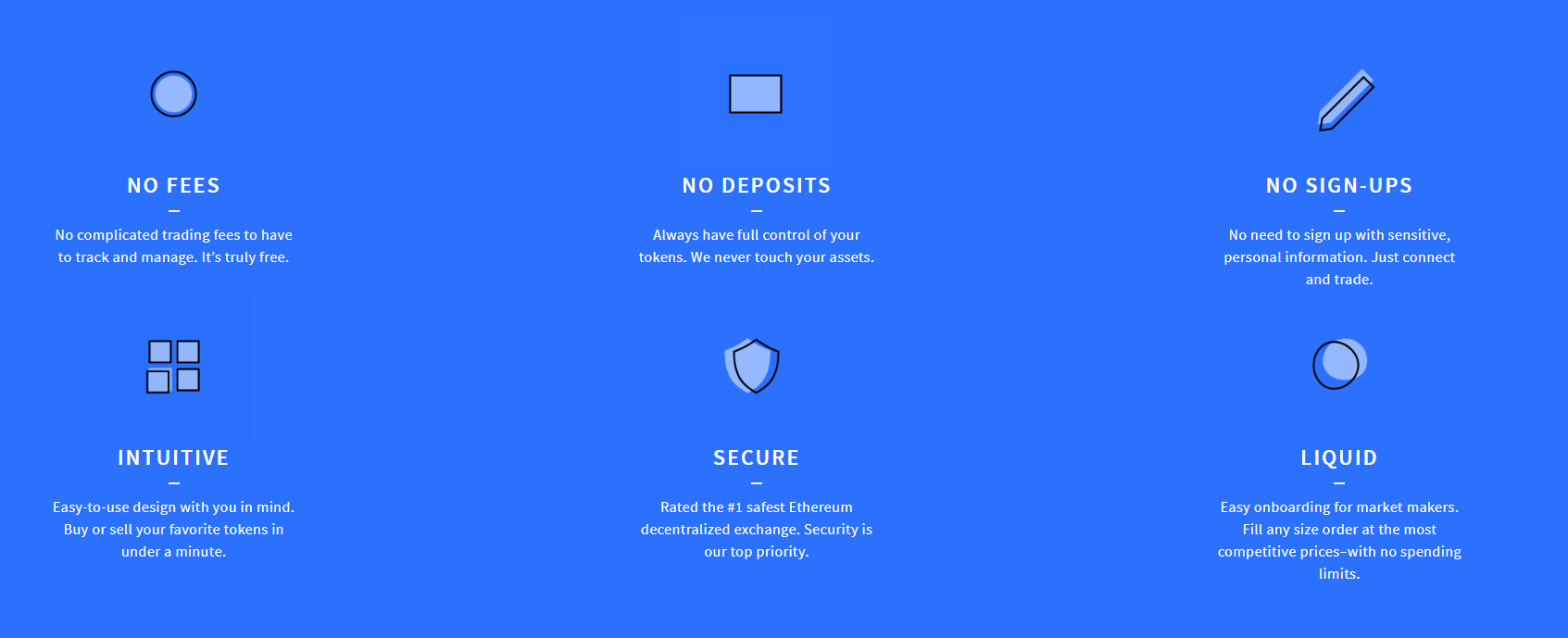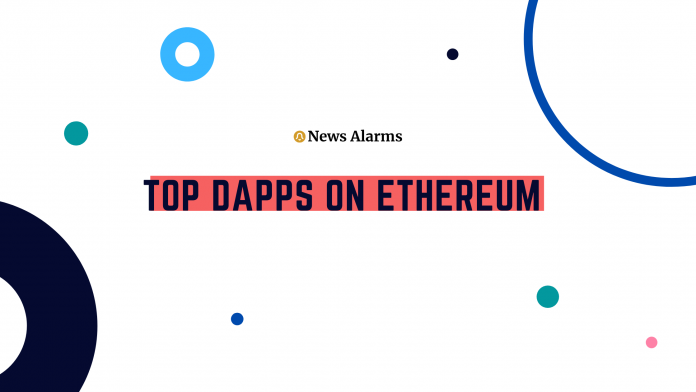What are Dapps you might ask?
Imagine having your car working away, transporting passengers while you’re at work. Imagine having your computer utilizing its spare capacity to serve businesses and people across the globe. Imagine being paid for browsing the web and taking ownership of your, arguably invaluable, attention. Imagine a world like that. That world is not far away.
A paradigm shift in the way we view software models is approaching. When Bitcoin, the first cryptocurrency, made us reassess our definition of Store of Value (SoV), it also revealed a sneak peek of the future: a world running on decentralized applications (Dapps). These distributed, resilient, transparent, and incentivized applications will prove themselves to the world by remapping the technological landscape.
Top dApps In 2020
- IDEX: IDEX is a “decentralized exchange” that launched in October 2016.IDEX is the first Ethereum based decentralized smart contract exchange to support real-time trading. It claims to be the most advanced Ethereum DEX. It supports limit and market orders, gas-free cancels, and the ability to fill many trades at once.
The exchange consists of a smart contract, a trading engine, and a “transaction processing arbiter”. The smart contract is responsible for storing all assets and executing trade settlement. The user has to verify all trades using the user’s private keys.
Unlike most other decentralized exchanges, IDEX has built a smart contract that only allows the exchange to submit signed trades to Ethereum. This enables the exchange to control the order in which transactions are processed, separating the act of trading from the final settlement. As users trade, their exchange balances updates in real-time, while simultaneously they use their private keys used to authorize the trade in the contract. This authorization prevents users from rescinding any completed trades and prevents the exchange from initiating any unauthorized trades.
The platform is available in English, Spanish, Russian, South Korean, Vietnamese, and Mandarin.
- ForkDelta: ForkDelta is an Ethereum token exchange, listing more ERC-20 coins than some other of its kind. Vitally, ForkDelta as of now goes about as an open-source, refreshed interface for EtherDelta’s smart contract.
In a quickly expanding crypto market offering, the exchange records new ERC-20 tokens day by day, enabling a platform for ICO funding in light of token trading and entrenchment. For all intents and purposes, each offered ERC-20 token is available for exchange on ForkDelta, building on the tremendous application the protocol has found in the crypto sphere.
As one can figure from the name, ForkDelta is a fork of EtherDelta. It maintains the EtherDelta smart contract construct – and the 0.3 percent trading expense is paid over to EtherDelta, as well.
In spite of the fact that ForkDelta has its own new request book, token listing framework, API, and front-end UI, it is a virtual duplicate of the EtherDelta exchange. The open-source project’s advancement can most proficiently be followed on GitHub.
ForkDelta is a P2P entry, without a focal substance controlling trading. Users store their own particular funds, and exchanges by means of the exchange happen specifically between users employing a similar smart contract.
- Bancor: Bancor Protocol is a standard for a new generation of cryptocurrencies that are called Smart Tokens. Bancor Network is a decentralized exchange that allows you to hold any token and convert it to any other token in the network. This is done with no counterparty, but at an automatically calculated price.As stated on the exchange’s website:
“Bancor’s decentralized liquidity network redesigns the way people create and share value by ensuring continuous on-chain liquidity between blockchain-based assets.”
Bancor Network lists credit card acceptance, 24/7 support, and transparent pricing as three of their main advantages. We do indeed agree that these features are advantages.
- LocalEthereum: Localethereum is a worldwide marketplace for people to buy and sell Ether. It’s a peer-to-peer marketplace where buyers and sellers can pick out each other’s listings and make a deal.You can find people trading ETH with your local currency and choose whatever payment method works best for you as long as the other trader is happy with it.
For security and safety, it uses an Ethereum-powered escrow service to securely hold funds until transactions are concluded, and its end-to-end encryption means buyers and sellers can communicate in complete privacy.
How does trading work?
Before trading, you will need to have an Ethereum-compatible cryptocurrency wallet.
Trading securely involves a few steps.
The buyer and seller confirm and agree on the terms of the trade.
The seller places the Ether into a Localethereum escrow smart contract. This provides proof of funds and shows that they actually possess the Ether they’re selling.
The buyer makes their payment to escrow.
From here, the seller confirms the payment, at which point escrow is released and the trade completed.Generally, either party has a couple of hours to cancel the trade and withdraw their funds from the escrow if it’s not in order.
If something is off, either party can raise a dispute. Localethereum then brings in a third-party arbitrator and gives them the keys to decrypt the communication between the parties. After looking at the communication, the arbitrator reaches a decision.
- Token Store: Token.Store is a decentralized cryptocurrency exchange launched in July 2017. As such, it doesn’t have a specific “home country”. Decentralized exchanges are becoming increasingly more popular. They are definitely gaining market shares against their centralized counterparts.This exchange’s main function is to enable purchasing and selling ERC20-tokens. What Token.Store has done more specifically is to plug into several other decentralized exchanges and thus create more liquidity at the exchange. In spite of this, the liquidity is still quite low (around USD 130,000 on a daily basis).
On the date of last updating this review (19 July 2019), Token.Store stated on their website that they had processed 500K+ transactions and had 300+ listed assets.
- Kyber Network: Kyber Network is a new form of cryptocurrency exchange. They describe themselves as follows:“Kyber’s on-chain liquidity protocol allows decentralized token swaps to be integrated into any application.”
They further claim that the above enables value exchange to be performed seamlessly between all parties in the ecosystem. This picture illustrates it further:

The Kyber Network platform launched in February 2018 and is thus quite new. It competes on its home-turf Singapore with each of the following exchanges (although they have a different offering): Coinbene, Coinut, COSS, Coinhako, UEX, Cointiger, Kryptono, DragonEX, Coinhub, Tokenomy, Bitrue, ABCC, CRXzone, and Liquid.
To our knowledge, US-investors can trade here. We have at least not found any prohibition in their terms and conditions.
There is also clear information on the people in the team behind Kyber Network on the exchange’s website. The six main figures running the project are the following:

- AirSwap: AirSwap.io is yet another decentralized exchange. When you hear “AirSwap” in the cryptocurrency industry, it probably most often refers to the AirSwap-token. But back to the AirSwap.io-exchange. The exchange focuses on highlighting six advantages with the platform: – it’s intuitive;
– it’s secure;
– the exchange also has a high trading volume;
– it requires no sign-ups;
– it requires no deposits; and
– finally, it has low fees.
We have no reason to believe that US-investors would be prohibited from trading at this exchange. Generally speaking, it is more difficult for decentralized exchanges to prohibit residents or citizens from certain countries. However, as always, any US-investors interested in trading here should form their own opinion on any issues arising from their citizenship or residency.
- OasisDEX: OasisDEX is a “decentralized exchange”. Decentralized exchanges are becoming increasingly more popular. They are definitely gaining market shares against their centralized counterparts.
Decentralized exchanges do not require a third party to store your funds, instead, you are always directly in control of your coins and you conduct transactions directly with whoever wants to buy or sell your coins. Decentralized exchanges normally do not require you to give out personal information either. This makes it possible to create an account and right away be able to start trading. The servers of decentralized exchanges spread out across the globe leading to a lower risk of server downtime. However, decentralized exchanges as opposed to regular top crypto exchanges normally have an order book with lower liquidity than the regular top crypto exchanges.
As OasisDEX is a decentralized exchange, it does not list US-investors as prohibited from trading. However, US-investors should still do their own independent assessment of any problems arising from their residency or citizenship.
- Enclaves DEX: Enclaves DEX works by aggregating liquidity from EtherDelta and ForkDelta (with new exchanges being added shortly), as well as providing its own native order book (with zero fees on all maker orders, and zero fees on taker orders under 0.1 ETH).
This means you can take advantage of the Enclaves DEX smart contract and wallet to trade across multiple exchanges, benefiting from low fees, error-tolerant smart contract design, and a simplified and consistent user interface.
The smart contract is live and verified on https://etherscan.io, with an ENS name of enclavesdex.eth.
Extensive testing is done, including fuzz testing on the contract and order book, and will be announcing a public bug bounty shortly.

Fuzz testing our contracts using the Truffle framework Please note that Enclaves DEX should be used only for trading utility tokens, and any use is entirely at your own risk. Enclaves DEX is not responsible for any losses made from trading tokens, or using our smart contract.
Most Asked Questions
- What is the meaning of dApp?
- What are dApps used for?
- Is a smart contract a dApp?
- What are the best dApp platforms?
- What are the best dApps in 2020?
What is the meaning of dApp?
The term “dApp” is an abbreviation for decentralized application. These applications look exactly like any other app on your mobile device. The difference between an app and a dApp is that the backend of the latter runs on a decentralized peer-to-peer (P2P) network instead of centralized servers.
Just like regular apps, the frontend of dApps can be written in any language. As for hosting, dApps can opt for decentralized storage, such as Swarm or IPFS. While many of us still haven’t tried dApps, they can be easily downloaded from Google Play or App Store.
Theoretically, dApps should meet the following criteria:
- Open Source: the source code should be publicly available.
- Decentralized: it leverages cryptographic technology to run operations.
- Incentive: it offers incentives to users in the form of digital tokens.
- Protocol: the system generates tokens and includes an inbuilt consensus mechanism.
What are dApps used for?
As mentioned above, dApps are a lot like regular apps on your device. That said, dApps can be used for any purpose. From casino games to token swaps to search engines, there are no limits for what dApps can do. However, it’s important that regardless of its purpose, it incentives the usage of the application through digital tokens. After all, that’s an essential part of a decentralized application.
Is a smart contract a dApp?
No, a smart contract is a computer protocol that automates the execution of agreements between the multiple parties without the interference of intermediaries. In other words, smart contracts are lines of code that allow contracts to self-execute when certain terms and conditions are met.
While smart contracts are not dApps, they are used to run them. Typically, a centralized application interacts with a database via API to provide the data you request. Decentralized applications, on the contrary, interact with the blockchain through smart contracts.
Best Platforms for Blockchain dApp
Not long ago, blockchain was a synonym for Bitcoin. Today, that’s no longer the case. As developers found out additional use cases for the distributed ledger technology, like dApps and smart contracts, numerous companies started to develop their own blockchains. So… what’s the best platform for blockchain dApps?
Ethereum
This blockchain hardly needs an introduction. Released in 2015 by Vitalik Buterin, this open-source distributed computing platform has gained huge popularity as many decentralized projects issued tokens on top of its blockchain. Over the years, Ethereum’s multiple protocols have given birth to over 2000 dApps, including well-known Cryptokitties, IDEX, 0xUniverse, among others.
The increasing number of applications depending on this blockchain has certainly helped Ether (ETH) to become one of the strongest cryptocurrencies by market capitalization. Overall, Ethereum is solid choice for launching a decentralized application, although it has one big disadvantage: fees. The Ethereum network works with a Proof-of-Work (PoW) consensus algorithm, which consumes plenty of computational power. At the end of the day, that computational power translates into high fees.
NEO
Whatever product goes out, a cheaper (and sometimes better) Chinese version follows. This rule also applies to blockchain. NEO, also known as the “Chinese Ethereum” has recorded a top speed of 2400 transactions per second and on average processes 400 TPS. Compared to Ethereum’s 15 TPS, this network offers decentralized applications an environment geared for scalability.
While NEO is able to handle a higher number of transactions, it charges high fees. In some cases, even higher than those charged by the Ethereum network. At the moment, there are nearly 75 dApps based on this blockchain.
TRON
Despite being one of the newest players, TRON is already seen as a true “Ethereum Killer” due to its ability to offer high speed, massive scalability, and low fees. This blockchain has gained its popularity as a go-to choice for many crypto gaming and gambling sites. In terms of transactions, TRON processes about 300,0000 transactions per day, making it a suitable platform for high-volume gaming decentralized applications.
EOS
Released in January 2018, this relatively new blockchain has become a real threat to Ethereum as it deals with over 50,000 daily users, three times more than Vitalik’s platform. Again, the promise of this platform is around the same points aforementioned: transaction speed, throughput, and low fees.


